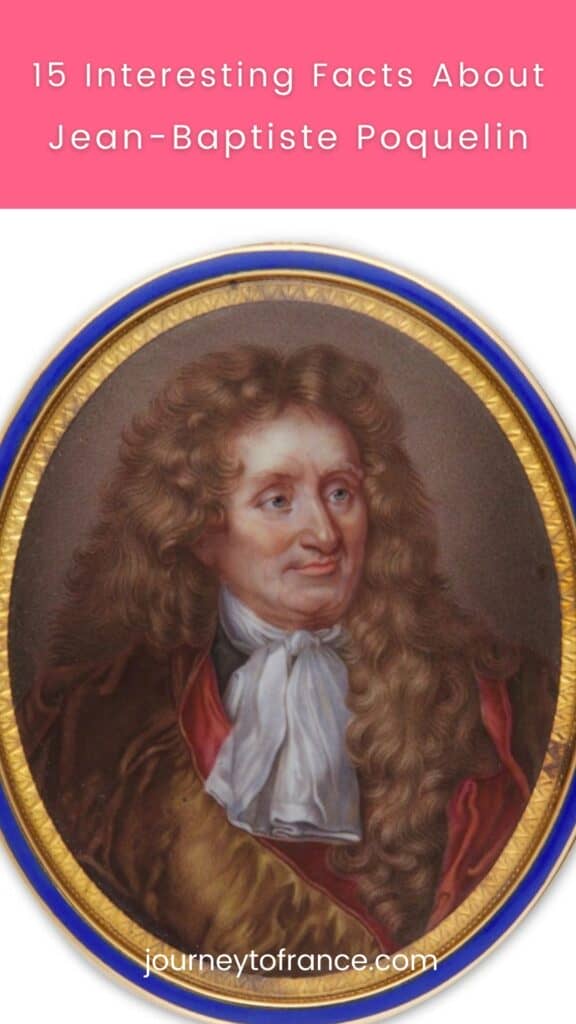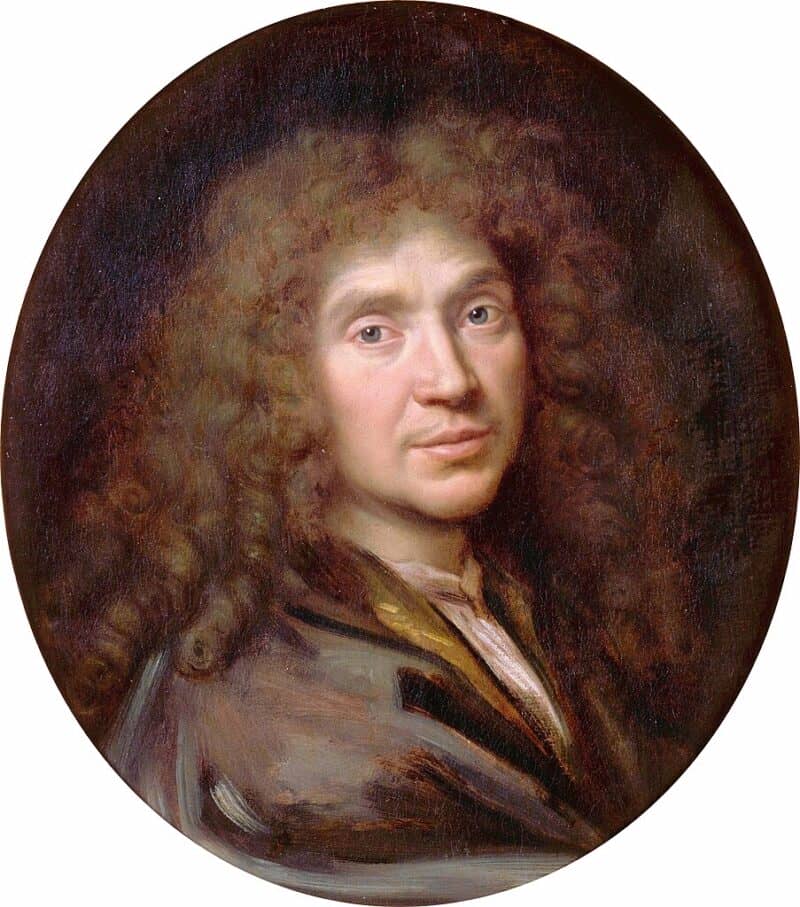Do you want to know some interesting facts about Molière?
Born Jean-Baptiste Poquelin on January 15, 1622 in Paris, he came from a wealthy family of carpet sellers. He called himself “Molière” and went to become one of the greatest comedians of all time and the father of modern French comedy.
He studied at the prestigious Collège de Clermont, where he became friends with the philosopher Pierre Gassendi.
Molière wrote witty and satirical plays that mocked the hypocrisy and pretensions of his society, especially the clergy, the nobility, and the bourgeoisie. He also created a new form of musical theater with his friend and composer Jean-Baptiste Lully.
Molière is considered one of the most important playwrights who ever lived. His works are still among the most played in the world today. They have been translated into different languages and adapted for various media.
Read on to learn more interesting facts about Molière.
Things you'll find in this article
- 15 Interesting Facts About Molière
- 1. Molière left his parents’ household to pursue a career in theater
- 2. He adopted the stage name “Molière”
- 3. He started his career by playing tragedy plays
- 4. He was booed and thrown baked apples at during performances
- 5. He spent 13 years touring the provinces with his troupe
- 6. He returned to Paris in 1658 and gained the patronage of King Louis XIV
- 7. He wrote and acted in some of the most famous and influential comedies in French literature
- 8. He was a co-creator of the comédie-ballet genre of musical theater
- 9. His marriage was unhappy and plagued by infidelity and lawsuits
- 10. He contracted pulmonary tuberculosis during his provincial tours
- 11. He died on stage while performing one of his own plays
- 12. The Church denied him a Christian burial
- 13. He influenced many writers
- 14. He is honored by the Académie Française
- 15. He has a crater on Mercury named after him
15 Interesting Facts About Molière

1. Molière left his parents’ household to pursue a career in theater
When Jean-Baptiste Poquelin reached adulthood, he made a daring decision to leave his family’s home and join a traveling theater troupe, leaving behind both his father’s business and his legal studies. The theater company he joined was known as the Illustre Théâtre in 1643.
During that period, it was the norm for theater groups to travel from town to town to present their plays. Initially, he performed roles in plays authored by others, and it was only later that he ventured into playwriting himself.
2. He adopted the stage name “Molière”
He chose the name “Molière” for himself, and it’s possible he got inspired by the French word for “miller” (meunier) or maybe even from a dainty village down in southern France called Molières.
3. He started his career by playing tragedy plays
During that period, tragedy dominated the writing and performance scene. In this environment, Molière began his career by taking on tragic roles, particularly those written by Pierre Corneille, another renowned French playwright. However, Molière’s skills in tragedy didn’t receive much acclaim from his audience, leading to numerous setbacks and failures during his tragic performances.
4. He was booed and thrown baked apples at during performances
Back in the day, the audience used to get pretty vocal during performances. They’d stand up, clap, boo, and sometimes even call out the actors. If the audience weren’t too happy with the play, they could buy baked apples from stands at the back and throw them at the actors.
Poor Molière got a taste of that when he tried tragedy, but he eventually discovered his knack for comedy and left those apple-throwing days behind him.
5. He spent 13 years touring the provinces with his troupe
Molière embarked on an extensive 13-year journey, during which he and his theater company traveled through various regions outside the major cities.
Throughout this period, their performances encompassed a wide range of dramatic genres, including comedies that brought laughter, tragedies that stirred deep emotions, and farces that tickled the audience’s funny bone.
This experience allowed him to refine his skills and connect with a wide range of audiences in provincial areas.
6. He returned to Paris in 1658 and gained the patronage of King Louis XIV

In 1658, upon returning to Paris, a remarkable development occurred in his career. He garnered the attention and secured the backing of King Louis XIV himself.
This royal support marked a pivotal moment for him, as the king not only acknowledged his talent but also granted him the privilege of using the renowned Palais-Royal theater.
This was a significant honor and a golden opportunity, given that the Palais-Royal was among Paris’ most esteemed theaters at the time. With this backing, Molière’s career as both a playwright and actor reached new heights, strengthening his role as an integral figure in the 17th-century French cultural landscape.
7. He wrote and acted in some of the most famous and influential comedies in French literature
Molière wrote and performed in a series of influential comedies that have stood the test of time.
Some of these notable works include The School for Wives, which tackles marriage and jealousy; Tartuffe, a satire on religious hypocrisy and naivety; The Misanthrope, an examination of honesty and social norms; The Miser, a humorous commentary on greed and family dynamics; The Imaginary Invalid, a farcical portrayal of the medical field and hypochondria; and The Bourgeois Gentleman, a parody of social ambition and pretension.
Molière’s gift for humor and satire not only entertained but also offered insightful commentary on the society and culture of his era. These works have endured over the centuries, continuing to amuse, provoke thought, and provide valuable perspectives on the human experience.
8. He was a co-creator of the comédie-ballet genre of musical theater
Molière and the composer Jean-Baptiste Lully teamed up to invent something new in the world of theater. They came up with a whole new style of musical theater called comédie-ballet. This awesome creation mixed together talking, singing, and dancing to make something truly unique.
9. His marriage was unhappy and plagued by infidelity and lawsuits
In 1662, Molière married Armande Béjart, who happened to be either the sister or maybe even the daughter of his fellow actor, Madeleine Béjart. Together, they had two sons and a daughter. However, their marriage was far from a fairy tale and was marked by infidelity and frequent legal battles.
10. He contracted pulmonary tuberculosis during his provincial tours
He had a tough time with pulmonary tuberculosis, which he picked up during his travels around the province. It was quite challenging for Molière because he would sometimes cough up blood while performing on stage, and breathing became a real struggle.
11. He died on stage while performing one of his own plays
He passed away on February 17, 1673, not long after he collapsed during a performance of his own play, The Imaginary Invalid. It’s said that he was wearing green that day, which was thought to be an unlucky color for actors. But despite that unfortunate moment, he left us with an incredible legacy of works that continue to be cherished and performed even today.
12. The Church denied him a Christian burial

Molière faced a tough time with the Church, who weren’t too pleased with his plays, considering them a bit on the wild side. As a result, they didn’t give him a proper Christian burial. Instead, his friends had to sneakily bury him in a humble cemetery under the cover of night.
13. He influenced many writers
He had a huge impact on numerous writers, including Voltaire, Diderot, Beaumarchais, Goldoni, Sheridan, Shaw, Wilde, Chekhov, and Ionesco.
14. He is honored by the Académie Française
Molière receives special recognition from the Académie Française, which presents the Prix Molière annually to celebrate outstanding French theatrical creations. You can spot his bust proudly showcased in the entrance hall of the Comédie-Française, the national theater of France that he played a significant role in founding.
15. He has a crater on Mercury named after him

Molière has got a crater named after him on Mercury. You can find it close to the Shakespeare and Cervantes craters, making it a trio of literary legends on the planet.

Hi, I’m Christine – a full-time traveler and career woman. Although I’m from the Philippines, my location independent career took me to over 40 countries and lived in 4 continents in the last 10 years, including France. A self-proclaimed Francophile, I love everything France.
